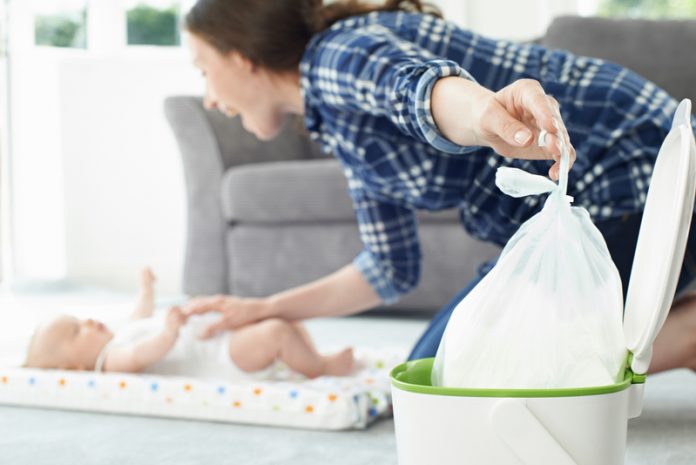Laura Crawford, Founder of Mama Bamboo, discusses why it is important for the Government to take action against nappy and wipe waste
Just like over 90% of the parenting population, I chose to use disposable nappies and wipes when my children were babies. This means that I personally put 12,000 nappies and 36,000 wipes into landfill in the space of 4 years. And I am not alone. Across the country we add a staggering 3 billion nappies and 11 billion wet wipes to that pile every year.
The government’s answer to this problem is to gently encourage parents to use cloth nappies and wipes. Their campaign has been running for over 6 years and has had limited impact. Recent experiments to encourage parents to use cloth nappies and wipes have largely been unsuccessful. A project in Belgium where mothers in a maternity ward were invited to participate in a pilot programme using reusable nappies for a period of 13 weeks did not achieve the take up hoped for. Out of a total of 436 women only 23 said they would continue to use reusable nappies at the end of 13 weeks – about 5%. Most of these women cited leakage, increased nappy rash, user unfriendliness, extra washing and drying and cost as the main reasons.
In the UK, reusable nappies and wipes account for less than 8% of the market. Most parents prefer the convenience and performance of disposables. The main downsides to these are that they are made using crude oil and chlorine, they are packaged in plastic and they make up 10% of single-use plastic black bin waste. Over the last few years, we have all become more aware of the nappy landfill and wet wipe ‘fatberg’ pollution caused by these single-use plastics.
One of the main reasons I founded my own nappy company was because I was horrified at the amount of plastic used in these single-use items and the amount of waste that went to landfill because of one tiny innocent human, but I did not like the alternative cloth options available. I decided to invest heavily in research and technology in order to design disposable nappies and wipes that were eco friendly. By using bamboo and corn starch we have found it is possible to save 150ml of crude oil and 10 ml chlorine for every single nappy made. Over the course of the average two and half years to potty train, that saves 1,000 litres of crude oil per baby.
Some of our customers do compost their nappies and wipes at home in hot compost bins, but many would prefer to use council industrial composting facilities. The technology exists to divert these nappies and wipes away from landfill but it will require Government investment to make industrial composting technologies mainstream.
Bioplastic Circular Economy
As a B Corp certified business, we are keen to promote a circular economy system that allows all non-plastic – or bio-plastic – disposables to be composted from a localised kerbside collection. We have partnered with UCL on their Bioplastic Circular Economy Study. In the study, this service could be extended not only to compostable nappies and wipes, but also compostable mailers, food packaging and bags. This is going to be of vital importance in the coming years.
This circular model is being used for nappies and wipes by several companies and councils across the globe with great success – Soiled Diaper, Toronto council, Earth Baby, Dycle. We know the technology works and that the collection and localised processing is feasible, but it requires investment and legislation change.
We need the UK to take action and to try and put pressure on the Government to make these changes sooner rather than later. Every day we delay another 8 million nappies and 30 million wet wipes are thrown away.
I recently set up a petition calling on DEFRA to reform the current targets and quotas system for diverting nappy and wipe waste away from municipal landfill to make it more economically advantageous for councils to invest in the circular model technologies.
Environment Bill
I also encourage everyone to support the Environment Bill which calls on government to standardise the labelling of ‘eco’ nappies to ensure that ‘eco’ really means ‘eco’; that nappy and wet wipe companies are very clear on exactly how ‘compostable’ their products are and that they do not use ‘greenwashing’ to promote their products.
https://publications.parliament.uk/pa/bills/cbill/2017-2019/0299/19299.pdf
Consumers should be very aware of exactly what they are buying and how to best dispose of it.
In an ideal world only compostable nappies and wipes would be available and plastic versions would be banned. However, this may be too much to wish for in the short term. Right now though it is perfectly possible for zero nappy and wipe waste to be sent to landfill. All plastic nappies and wipes could be sent to recycling centres and all compostable versions could be sent to industrial composting facilities.
At present, only Wales in the UK has invested in the technology to recycle plastic nappy and wipe waste but this has a large carbon impact – transporting heavy used nappies to the plant and running the machinery. It also results in a less than useful product – pinboards. It’s a step in the right direction but with investment and commitment the UK could take a giant leap in the right direction.
It seems ridiculous that in the face of changing technologies and processes being proven viable, the majority of UK councils continue to send nappy waste to landfill simply because it’s the cheapest option.











